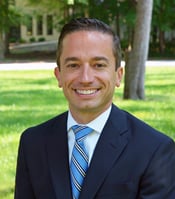Today we’re sharing insight from guest blogger Adam Kronk, Head of School for La Lumiere School. We hope you enjoy Adam’s wisdom and perspective.
 I might have stumbled across something pretty profound. Just maybe, it could be the key to unlocking the potential in our teams, a critical component to happiness in our homes, and a promising way to mend our fractured society, one relationship at a time.
I might have stumbled across something pretty profound. Just maybe, it could be the key to unlocking the potential in our teams, a critical component to happiness in our homes, and a promising way to mend our fractured society, one relationship at a time.
It’s a question, actually. And it’s simple: “What are you going through?” The process starts by asking someone—anyone, pretty much—this question. (Or using the true investigation of this question as the point of your conversation.)
And then there’s a crucial next step, which perhaps presents the challenge: we have to listen to the answer. We have to pay attention to the respondent. And beyond that, we have to go so far as to ask ourselves whether the way we treat that person—how seriously we take them, what labels we’ve placed on them, etc.—could or should change in light of what we’re hearing. Whether there might be a good reason, based on their experiences, that they feel or think what they do.
I have to admit a few things. First, I didn’t come up with this. A good friend of mine, Lenny DeLorenzo (a theology professor at the University of Notre Dame and director of their Notre Dame Vision program), wrote an article recently wherein he speculated what the late French philosopher Simone Weil might say to Americans today in a time when things feel unprecedentedly polarized and folks seem willing to write off whole swaths of humanity as “the other” without much, or any, consideration.
Second, I don’t do what I’m recommending here nearly enough. An underclassman at our school who is grappling with the loss of a loved one and having a hard time focusing on her work. A junior trying to balance challenging coursework and the pressure of the college admission process. Parents of international boarding students whose cultural contexts and language barriers make for confusion when communicating about their children. A maxed-out teacher we’re asking to implement a new, time-consuming system of progress reports.
Do I really bother to slow down for a minute and ask these human beings, each of whom is the protagonist in his or her own life, how they’re doing? Do I take their personal narrative into account when I see them, speak to them, or pass them on campus? And do I make decisions that will affect them with this in mind?
At home, do I go with the cursory, “How was your day?” Or do I truly seek to understand what it’s been like to be my wife today? Am I frustrated by a potty-training setback or do I work on getting inside my toddler’s head and grapple with the foreign territory he’s attempting to navigate with a new baby brother, a new house, and a dad who’s still adjusting to a new job?
It’s something worth trying. But there’s a caveat: one thing that might happen, when it comes to things like politics or religious views or parenting techniques or even a prevailing paradigm at work, is that when we genuinely seek out and listen to what someone else is going through, we might have to consider changing what we think and how we act. That is an unsettling, if not exhausting and at times terrifying, prospect. Unless we’re open to this, though, the whole exercise loses its potential.
What’s The Risk?
The risk, if we fail to ask this question, is charging ahead through life without empathy, without an acknowledgement that for the people we encounter, a set of circumstances we probably don’t fully understand informs who they are and what they think. The risk is missing a chance to become a better colleague, spouse, parent, friend, or citizen. The risk, ultimately, is squandering the opportunity we have to grow into better versions of ourselves.
This content was written and shared by guest blogger, Adam Kronk.
 Adam Kronk started in July as La Lumiere School’s seventh Head of School. A University of Notre Dame alumnus, Adam earned both his Bachelor of Arts in English Literature and Master of Nonprofit Administration degrees, both summa cum laude.
Adam Kronk started in July as La Lumiere School’s seventh Head of School. A University of Notre Dame alumnus, Adam earned both his Bachelor of Arts in English Literature and Master of Nonprofit Administration degrees, both summa cum laude.
Before coming to La Lumiere, Adam led the Notre Dame Deloitte Center for Ethical Leadership in Notre Dame’s Mendoza College of Business, where he also taught ethics in the Management Department. He began his career in the classroom as an English teacher at University of Detroit Jesuit High School & Academy. He then worked overseas as Notre Dame’s Director of Campus Ministry Outreach in Europe, before returning to South Bend and serving as Chief Operating Officer of the Center for the Homeless; a nationally recognized residential facility providing extensive programming and on-site services to more than 200 men, women, and children. There he met his wife, Jacqueline, and after working together for five years, they moved to Southeast Asia to help lead PEPY; an international organization working to improve access to quality education in rural Cambodia.
Adam and Jacqueline have three young sons: Sorin (4), Leo (2), and Teddy (6 months).



